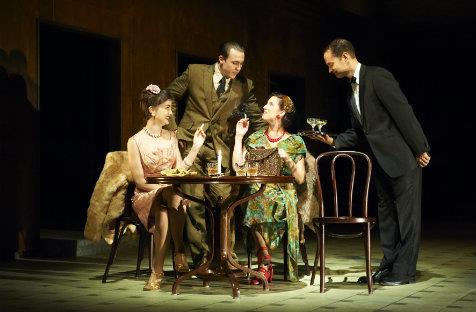Arthur Miller’s classic play about broken dreams follows salesman Willy Loman’s later life reflections and his vivid memories that interrupt them. He struggles to find ‘the answer’, the secret to a successful life, right up to the shocking end of the play.
Across the cast, there were no weak performances, each player delivering the goods appropriate to their part(s), and accent work remaining consistent throughout. John Stanton as Willy had a brilliant stage presence, his posture as eloquent as any of his lines. His growing confusion between the past and present was accentuated by the large expanse of open stage, allowing lines of sight beyond the characters immediately interacting with him in the present. His demeanour allowed him to make believable Loman’s incongruous self-image as a man of integrity, despite his many moral flaws and lapses.
Biff (Josh McConville) delivered a pain-filled performance of a man discovering the true essence of himself, not liking what he finds, and then trying to pull the shades from the loving eyes of those around him. Caroline McKenzie played a steadfast Linda Loman, fiercely loving and loyal for decades of married life. She played her emotion-heavy role with integrity, her final scene carrying an intense emotional hit. Happy (Ben O’Toole) came across as well-named, O’Toole presenting the man’s fickle foibles as charmingly understandable. Charley (Igor Sas) and his son Bernard (Eden Falk) were both well-grounded and straight-talking, a welcome change from Willy’s mass of confused imaginations. Sas’s delivery of the poetic description of the life of a salesman was a gem.
Black Swan’s technical team have again pulled out all the stops, using every inch of the huge stage available, and accentuating its depth with a tall, high-ceilinged set. The attention to grimy, industrial detail resonated with the gradual decay and deterioration of Willy’s life and dreams. Costumes and props were all impressively authentic and consistent with the period, providing visual interest as well as a point of reference for dialogue about opening car windscreens. Changes in lighting between the past and the present reflected the concept of ‘golden days’, as happy family memories collide with the harsh realisations of the present day, interspersed beams of light separating the overlapping actions of the actors.
Some quibbles about the acoustics came from further back in the theatre, it being difficult to follow such a wordy production when conversations were only half heard. From the stalls, however, there was nothing to fault; there was clear diction from all performers with faithful delivery of classic lines.
Sometimes a classic doesn’t need any fancy additions, and in their presentation of Death of a Salesman, director Adam Mitchell and Black Swan have delivered a compelling, heartfelt version of a tale that resonates in every time.
Rating: 4 stars out of 5
Death of a Salesman
By Arthur Miller
Presented by Black Swan State Theatre Company
Directed by Adam Mitchell
Set & Lighting Designer: Trent Suidgeest
Set Design Concept: Alicia Clements
Costume Designer: Lynn Ferguson
Sound Designer/Composer: Ben Collins
Dialect Coach: James Hagan
Performed by Austin Castiglione, Adriane Duff, Eden Falk, Luke Hewitt, Talei Howell-Price, Josh McConville, Caroline McKenzie, Jo Morris, Ben O’Toole, Igor Sas and John Stanton
Heath Ledger Theatre, State Theatre Centre, Perth Cultural Centre, Northbridge
4 – 25 May






